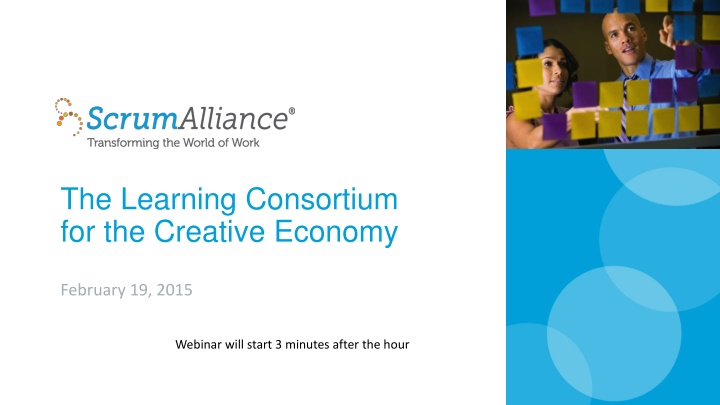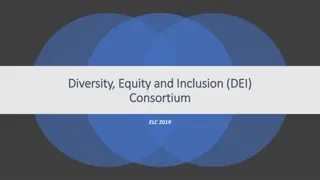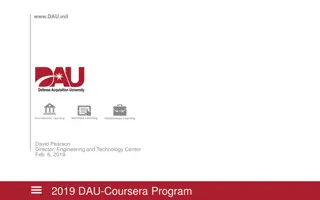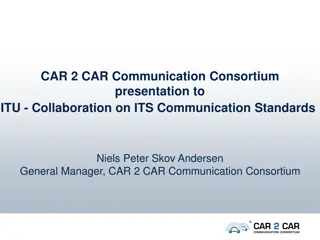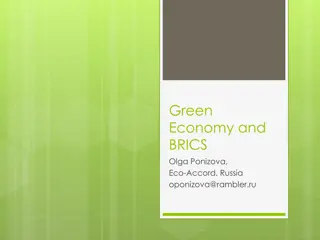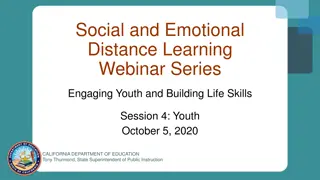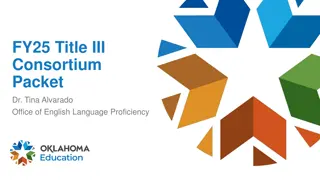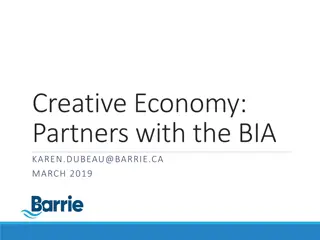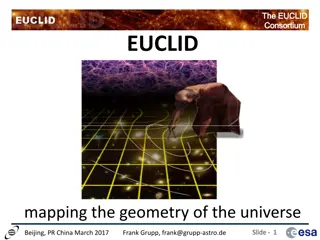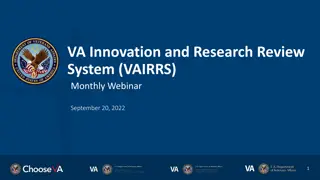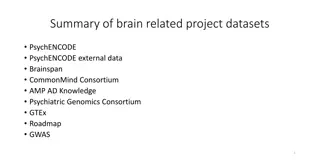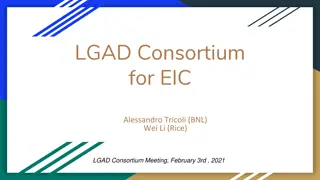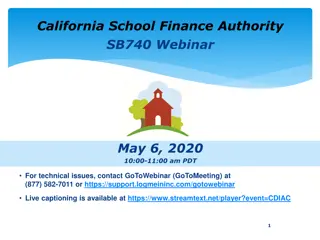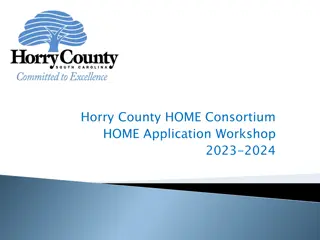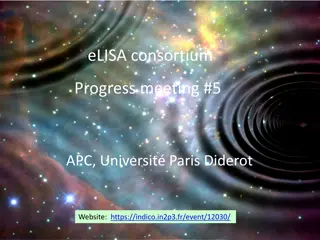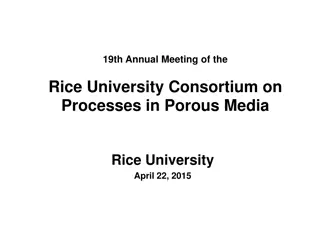The Learning Consortium for the Creative Economy Webinar Summary
The webinar on The Learning Consortium for the Creative Economy discussed key topics such as agenda details, presenters' backgrounds, poll results, and insights on the Creative Economy and its importance. Participants engaged in discussions on topics like the Recap on the Creative Economy, Scaling of Scrum and Agile, and progress updates on the Learning Consortium. The session provided valuable information for individuals interested in participating in webinars, staying informed about the Consortium, and engaging in a community of practice related to the Creative Economy.
Download Presentation

Please find below an Image/Link to download the presentation.
The content on the website is provided AS IS for your information and personal use only. It may not be sold, licensed, or shared on other websites without obtaining consent from the author.If you encounter any issues during the download, it is possible that the publisher has removed the file from their server.
You are allowed to download the files provided on this website for personal or commercial use, subject to the condition that they are used lawfully. All files are the property of their respective owners.
The content on the website is provided AS IS for your information and personal use only. It may not be sold, licensed, or shared on other websites without obtaining consent from the author.
E N D
Presentation Transcript
The Learning Consortium for the Creative Economy February 19, 2015 Webinar will start 3 minutes after the hour
What is the Learning Consortium? A. B. C. D. Who is presenting today? decades of management experience at the World Bank with many years of consulting and research on leadership and management issues. He now writes for Forbes.com. He is the author of eight books, including The Leader s Guide To Radical Management (2010) and The Leader s Guide To Storytelling (2010). Jay Goldstein is an adjunct lecturer in entrepreneurship at McCormick School of Engineering at Northwestern University. He teaches Entrepreneurial Selling and Scaling with the application of advanced Agile mind-sets and methods; he is a serial entrepreneur and was a founding partner in Jabbok River Group, which invests in early-stage companies to accelerate innovation and growth. Michael Pacanowsky is the director of the Center for Innovative Cultures at the Bill and Vieve Gore School of Business at Westminster College in Salt Lake City, Utah. He is also the Gore-Giovale Chair in Business Innovation at Westminster College. He worked for several decades with W. L. Gore and Associates. Steve Denning is a board member of Scrum Alliance and combines several 2
The Learning Consortium for the Creative Economy A. B. C. D. Agenda A. Recap on the Creative Economy B. Questions on the Creative Economy C. Scaling of Scrum and Agile D. Progress on the Learning Consortium 3
The Learning Consortium for the Creative Economy A. B. C. D. Poll result from January 21 webinar: I am most interested in: Participate in webinars on the Creative Economy .. 37% Being informed about the Learning Consortium ......... 30% Participate in a community of practice .. 13% Establishing/leading such a community of practice .. 7% Participate in online discussion 6% 4
The Learning Consortium for the Creative Economy A. B. C. D. Poll I participated in the January 21 webinar Yes No 5
What is the Creative Economy? A. B. C. D. The vertical world of traditional management Turbulent environment Boss Liabilities Complexity Inefficient Lacking agility Individuals Average = inadequate Non-collaborative Roles Rules Plans Reports Linear plans Dispiriting to staff Customer is absent
What is the Creative Economy? A. B. C. D.
What is the Creative Economy? A. B. C. D. Vertical mindset Horizontal mindset
What is the Creative Economy? A. B. C. D. The Copernican Revolution in management Firm Customer The firm Customer It is leading to vast economic, social and political change 9
The transition to the Creative Economy is more difficult than it looks A. B. C. D. Traditional Management The Creative Economy Goal Goal Delighting customers Make money for shareholders Role Communications From controller to enabler Role From command to conversations Top down commands Managers are controllers of individuals Communications From bureaucracy to Agile, Scrum, Lean Coordination Transparency Improvement Sustainability From value to values Values Coordination Efficiency, cost cutting Values Bureaucracy: rules, plans, reports The elements are interlocking
What is the Creative Economy? A. B. C. D. The transition is under way at the team level Agile/Scrum Bureaucracy Boss Team` Customer Product owner Individuals 11
What is the Creative Economy? A. B. C. D. The transition is also under way at the level of the firm Creative economy Traditional economy Cloud Teams Networks Ecosystems Platform Customer 12
What is the Creative Economy? A. B. C. D. There are many partial transitions Plugging Scrum teams into a bureaucracy creates friction Boss Boss Boss Scrum Product owner Team Customer Boss Boss Boss 13
What is the Creative Economy? A. B. C. D. Poll result from January 21 Where I work, there is tension between way Scrum teams are run and the way the rest of the organization is managed. Yes No In part Not sure Not relevant 40% 7% 36% 3% 13% 14
What is the Creative Economy? A. B. C. D. Poll: Where I work, there is tension between way Scrum teams are run and the way the rest of the organization is managed. To some extent Yes Not sure No Not relevant to my firm 15
What is the Creative Economy? A. B. C. D. There are many partial transitions Plugging Scrum teams into a bureaucracy creates friction Boss Boss Boss Scrum Product owner Team Customer Boss Boss Boss 16
Questions on the Creative Economy A. B. C. D. Q. Where did the term, "Creative Economy" come from? Is there a better term? - Sue
Questions on the Creative Economy A. B. C. D. Q. Is there a better term? A. Possibilities include: - Agile? - the Innovation Economy? - Innovation Management? - the Creative Economy?
Questions on the Creative Economy A. B. C. D. Q. So what needs to change at the "C" level of a public company to align the paradigm shift now under way at the Scrum team level? Kurt
The transition to the Creative Economy is more difficult than it looks A. B. C. D. Traditional Management The Creative Economy Goal Goal Delighting customers Make money for shareholders Role Communications From controller to enabler Role From command to conversations Top down commands Managers are controllers of individuals Communications From bureaucracy to Agile, Scrum, Lean Coordination Transparency Improvement Sustainability From value to values Values Coordination Efficiency, cost cutting Values Bureaucracy: rules, plans, reports The elements are interlocking
What is the Creative Economy? A. B. C. D. Maximizing shareholder value Jack Welch former CEO of GE has called it the dumbest idea in the world. Vinci Group Chairman and CEO Xavier Huillard has called it totally idiotic. Alibaba CEO Jack Ma has said that customers are number one; employees are number two and shareholders are number three. Paul Polman, CEO of Unilever [has denounced the cult of shareholder value. John Mackey at Whole Foods has condemned businesses that view their purpose as profit maximization and treat all participants in the system as means to that end. Just two weeks ago, Marc Benioff, CEO of Salesforce declared that this still-pervasive business theory is wrong. 21
What is the Creative Economy? A. B. C. D. Economics is driving change ROA and ROIC on US firms 1965-2011: Deloitte Center for the Edge For more and more firms, the question is: change or die 22
Questions on the Creative Economy A. B. C. D. Q. Is traditional leadership is willing to lose power moving to Agile where the power resides in the team? Fernando, Michael Agile/Scrum Bureaucracy Boss Team` Customer Product owner Individuals
What is the Creative Economy? A. B. C. D. Q. Have the firms you sometimes cite as exemplars like Apple, Amazon, Google or Salesforce really made the transition? Aren t they just as bureaucratic as the old dinosaurs? 24
What is the Creative Economy? A. B. C. D. Q. Is W.L. Gore & Associates an example of a firm that has made the journey to the Creative Economy? 25
What is the Creative Economy? Scaling A. B. C. D. Q. Does this have anything to do about scaling ? Enterprise Teams 26
What is the Creative Economy? Scaling A. B. C. D. At the TEAM Level At the ENTERPRISE Level Scrum SAFe XP LeSS Lean Unscaling ? Converged Agile Values and Principals (Still in Divergent stage) 27
What is the Creative Economy? Scaling A. B. C. D. Friction in 88% of Cases Boss Boss Boss Scrum Product owner Team Customer Boss Boss Boss 28
What is the Creative Economy? Scaling A. B. C. D. Scaling at the level of: 1. multiple teams working on the same product 2. multiple teams working on different products 3. cultural change throughout the organization 29
What is the Creative Economy? Scaling A. B. C. D. Benefit for Peer-to-Peer Learning: A Journey of Discovery Scaling Territory 30
What is the Creative Economy? A. B. C. D. Poll I am optimistic that my firm can make the transition to the Creative Economy Yes No Not sure Not relevant 31
What is the Learning Consortium? A. B. C. D. C. How can firms learn how to make this difficult transition? One suggestion: A Learning Consortium 32
What is the Learning Consortium? A. B. C. D. What is the Learning Consortium? The Learning Consortium enables firms that are on a journey towards the Creative Economy with more Agile modes of operating and continuous customer-focused innovation to work together to enable each member to optimize their competitiveness in a win-win environment using shared resources, experience and trust.. 33
What is the Learning Consortium? A. B. C. D. How the Learning Consortium will work We are inviting a group of firms to join the Consortium by end-February 2015. Members will share their progress on the shift to the Creative Economy Members will select the five most interesting firms for site visits. Site visits will take place from April through September 2015. An on-line conversation space for members will be established. An informal advisory panel will be available for consultation by members. A conference will be organized later in 2015. A report on findings of the consortium will be prepared in consultation with members 34
What is the Learning Consortium? A. B. C. D. What are the benefits of joining the Consortium ? Member Direct benefits 1. Peer-to-peer learning on site visits 2. A forum for trusted conversations in a safe space 3. Informal learning from other participants 4. On-line learning in real-time 5. The Learning Consortium conference and report Indirect benefits 1. Member-determined agenda 2. Access to core-team and the informal advisory panel 3. Assurance of state-of-the-art expertise 4. Brand recognition as an innovative company 5. Enhanced personal networks in management innovation 35
How can you help? A. B. C. D. Q. Who are the likely members of the Learning Consortium? 36
What is the Learning Consortium? A. B. C. D. Who can join the Learning Consortium? Any organization can join that is: Wanting to accelerate its journey towards the Creative Economy Keen to learn from other practitioners on the same journey Willing to share its experience with other practitioners Able to pay an administrative fee (now fixed at US $ 7,500) Willing to accept the Code of Ethics, which includes: No selling of services in the course of the Consortium No solicitation of staff by means of the Consortium 37
How can you help? A. B. C. D. Q. What about including other methodologies like Kanban? Linda, Ricardo Q. What are the future plans to expand to other places like Africa or Latin America? - Tony Q. What about small firms? - Alex Q. Can an association join? Alexander Q. Is the fee reasonable? - Christina 38
How can you help? A. B. C. D. Q. Are you looking for C-suite participants in the Learning Consortium? People lower down may not have needed influence. Jeff Q. Would participating in the Learning Consortium make sense for consulting organizations? Amy Q. Could Registered Educational Providers (REPs) join? Donna Q. If my organization decides not to join, can I join as an individual? Iwona 39
What is the Learning Consortium? A. B. C. D. How can you help the Learning Consortium? You could help us identify more member candidates Is your firm On a journey towards the Creative Economy? Interested in learning from other practitioners? Willing to share its experience? Let us know. We would love to talk with you. Contact: learningconsortium@scrumalliance.org 40
What is the Learning Consortium? A. B. C. D. Questions? 41
How can you help? A. B. C. D. Poll I want to be kept informed about progress of the Learning Consortium I want to participate in a series of webinars on the Creative Economy I want to participate in an (asynchronous) online Google group discussion about the Learning Consortium. I want to participate in a "community of practice" on the Creative Economy. I am interested in establishing and leading such a community of practice. 42
Thank you for attending The Learning Consortium for the Creative Economy February 19, 2015
